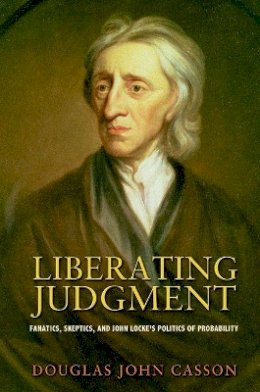
Stock image for illustration purposes only - book cover, edition or condition may vary.
Liberating Judgment: Fanatics, Skeptics, and John Locke´s Politics of Probability
Douglas John Casson
€ 89.83
FREE Delivery in Ireland
Description for Liberating Judgment: Fanatics, Skeptics, and John Locke´s Politics of Probability
Hardback. Examining the social and political upheavals that characterized the collapse of public judgment in early modern Europe, this book offers a different account of the achievement of liberal democracy and self-government. Num Pages: 296 pages. BIC Classification: HPS; JPA. Category: (P) Professional & Vocational; (U) Tertiary Education (US: College). Dimension: 227 x 152 x 20. Weight in Grams: 342.
Examining the social and political upheavals that characterized the collapse of public judgment in early modern Europe, "Liberating Judgment" offers a unique account of the achievement of liberal democracy and self-government. The book argues that the work of John Locke instills a civic judgment that avoids the excesses of corrosive skepticism and dogmatic fanaticism, which lead to either political acquiescence or irresolvable conflict. Locke changes the way political power is assessed by replacing deteriorating vocabularies of legitimacy with a new language of justification informed by a conception of probability. For Locke, the coherence and viability of liberal self-government rests not on unassailable principles or institutions, but on the capacity of citizens to embrace probable judgment. The book explores the breakdown of the medieval understanding of knowledge and opinion, and considers how Montaigne's skepticism and Descartes' rationalism - interconnected responses to the crisis - involved a pragmatic submission to absolute rule. Locke endorses this response early on, but moves away from it when he encounters a notion of reasonableness based on probable judgment. In his mature writings, Locke instructs his readers to govern their faculties and intellectual yearnings in accordance with this new standard as well as a vocabulary of justification that might cultivate a self-government of free and equal individuals. The success of Locke's arguments depends upon citizens' willingness to take up the labor of judgment in situations where absolute certainty cannot be achieved.
Product Details
Format
Hardback
Publication date
2011
Publisher
Princeton University Press United States
Number of pages
296
Condition
New
Number of Pages
296
Place of Publication
New Jersey, United States
ISBN
9780691144740
SKU
V9780691144740
Shipping Time
Usually ships in 15 to 20 working days
Ref
99-15
About Douglas John Casson
Douglas John Casson is assistant professor of political science at St. Olaf College.
Reviews for Liberating Judgment: Fanatics, Skeptics, and John Locke´s Politics of Probability
One of Choice's Outstanding Academic Titles for 2011: Top 25 Books "Casson has written a superb treatment of John Locke... Casson's writing is clear and accessible, and thus appropriate for any level of student already familiar with Locke's work. The book is an excellent contribution to Locke scholarship."
Choice "This is an attractive book, well printed, well bound, and well designed. Its arguments are always interesting, indeed fascinating, its scholarship is often admirable... Professor Casson [has written an] intelligent, ingenious, stimulating, searching and provocative ... piece of work."
Locke Studies
Choice "This is an attractive book, well printed, well bound, and well designed. Its arguments are always interesting, indeed fascinating, its scholarship is often admirable... Professor Casson [has written an] intelligent, ingenious, stimulating, searching and provocative ... piece of work."
Locke Studies
